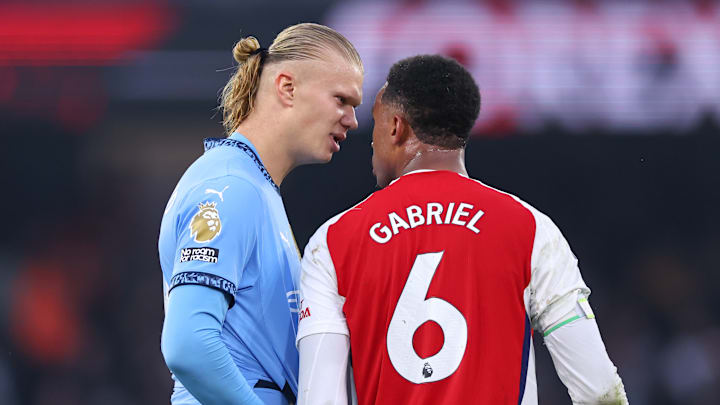The Sunday, September 22, 2-2 draw between Manchester City and Arsenal was a game in which the controversies numbered so many that the quality of soccer being played was suppressed. The fulcrum of all these disputes was expectedly Erling Haaland, the forward who has been getting accustomed to being the protagonist both for his goals and off-the-ball actions. However, this time it was not his statistics on the pitch that called all the attention, but rather an apparently unnecessary and disrespectful act: the infamous "ball throw" to Arsenal defender Gabriel Magalhães's head.
Follow Playing for 90 on X (Twitter).
The episode occurred during stoppage time, right after John Stones scored City's equalizer. While the Arsenal players were still remonstrating about conceding the goal in the dying embers, Haaland - in his haste to retrieve the ball from the net - caught Gabriel with his back turned and fired the ball directly into the head of the Brazilian. An angry-looking Gabriel had his shirt over his face. Referee Michael Oliver gave nothing, VAR did not intervene, and the FA later decided to take no action. That is when things started to get hot.
A Sign of Disrespect or Just Frustration Expressed with His Feet?
What Haaland did could have easily been classified as "unsportsmanlike conduct" was it not for the interpretation of the referee. The VAR led by John Brooks judged that the Norwegian had nothing violent in his conduct, hence not punishment-worthy. This infuriated Arsenal fans who had seen their team reduced to 10 men in the first half after Trossard received a second yellow for a foul on Bernardo Silva.
Where exactly is the line between passion and disrespect? Haaland now headlines not just for his 100th goal in a City jersey, but an act that was labeled cowardly by many, including former Arsenal player Ian Wright.
A Voice of outrage
Whenever Ian Wright, one of Arsenal's greatest legends, has something to say, people listen. Wright went hard on his social media at the act of Haaland on Sunday, labeling him a coward and suggesting that Gabriel Magalhães, had he been facing Haaland in this instance, would not have needed a second longer to stand up to the forward. For Wright, it wasn't an insult-Haaland acted like someone far beneath the quality of player he is.
"You know what really bothered me?" Wright began, setting the tone for his frustration. "That cowardly move from Haaland, throwing the ball at Gabi when he wasn't looking, when his back was turned. I thought you were better than that."
Wright was voicing the opinion of many fans, not just Arsenal supporters, but also lovers of the beautiful game who like to see respect on the pitch. The act by Haaland was open to different interpretations, but to all intents and purposes, it was an unwarranted incitement in a situation that was already hot.
Refereeing
Another aspect which just cannot be ruled out is the refereeing performance by Michael Oliver. He showed no hesitation in handing Trossard a second yellow during the game that left Arsenal a man down in the first half, while he did not even give a verbal warning for the incident involving Haaland and Gabriel.
But there was more to it than that-the VAR did not review the incident-which begged many questions about the consistency of technology's use in the game. Would Gabriel have received the same leniency if the situation had been reversed and he was punching Haaland? It's hard to say, but a feeling of injustice remains.
Impact on City and Arsenal
What is one to take away from this controversy-filled encounter? It restarts the debate that always seems to be present on referees and how they tend to influence the final outcomes of important matches. A draw that was quite bitter for Arsenal to digest, given the refereeing decisions, while for Manchester City, it was another step in pursuit of the top of the table with Haaland adding yet another goal to his tally.
And then it brings us to another important matter: the fact that Haaland is different, not only in regard to his talent but also in his character. For some, what happened with Gabriel was a manifestation of frustration; for others, it was an action that stained his reputation.
